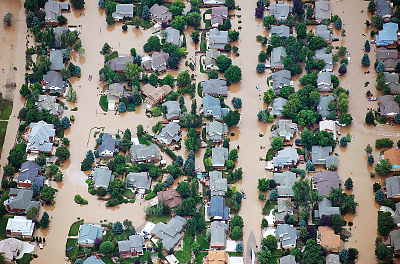Rare Floods Shock Colorado
Abstract
The sudden and record-breaking Colorado floods left area residents distressed but resilient, report psychiatrists who responded in the disaster’s aftermath.

The area around Boulder, Colo., is usually quite dry, and too much water is hardly a concern, said Emily McCort, M.D. “We’re prepared for wildfires, so floods caught us by surprise,” said McCort, a psychiatrist at the Wardenburg Health Center at the University of Colorado in Boulder.
Heavy rains in the mountains above Boulder September 8 to 11 eventually sent torrential runoff down area rivers and creeks and into the towns in the flood plains below.
Devastation was uneven. Many residents of Boulder and Longmont found water in their basements. Other places had it much worse.
“In Lyons, the river cut a new channel and destroyed 200 homes,” said Bill Myers, chief development officer of Mental Health Partners, the community mental health center in Boulder. “Lyons had to be evacuated because the water, sewage, and electrical systems were destroyed.”
Only four people lost their lives in the flooding, but property devastation, drowned livestock, and displacement have taken an enormous toll.
Mental Health Partners worked with the Federal Emergency Management Agency and the Red Cross to set up two disaster-assistance centers, which operated 10 hours a day for about three weeks, said Myers. At first, the people who came by were understandably concerned about safety and what their next pragmatic steps should be. “But after the first week, people were starting to come to grips with their losses and the emotional effects of the flooding,” he said.
The professional staff at Mental Health Partners took the initiative to look after their patients, many of whom have serious mental illness and low incomes. When telephone landlines were down, the staff drove around in their own cars to connect with patients.
“People are usually self-sufficient around here and being in need is not a familiar feeling,” said Myers. “Our goal is to be present but not to push.”
McCort, too, saw something similar in her patients, students who were “massively” affected by the floods.
“They have a lot of survivors’ guilt,” she said. “They seem apologetic because they feel that other people had it worse. People whose houses were untouched while their neighbors were wiped out are struggling and are unable to go through normal grief processes.”
In contrast, the flood also brought people together at the university, she noted. Students, professors, and staff had endured similar flood-related experiences and provided a lot of support for each other.
Some delayed emotional and psychological reactions were beginning to crop up by early October, Myers pointed out. Mental Health Partners reopened drop-in centers in Boulder and Longmont to help residents cope with “anxiety, sadness, depression, fear, guilt, anger, and other emotional distress.” ■
A sample of the information the University of Colorado provided to its students is posted at http://www.colorado.edu/2013flood/for-on-campus-students. Information about Mental Health Partners is posted at http://www.mhpcolorado.org/Home.asp.



